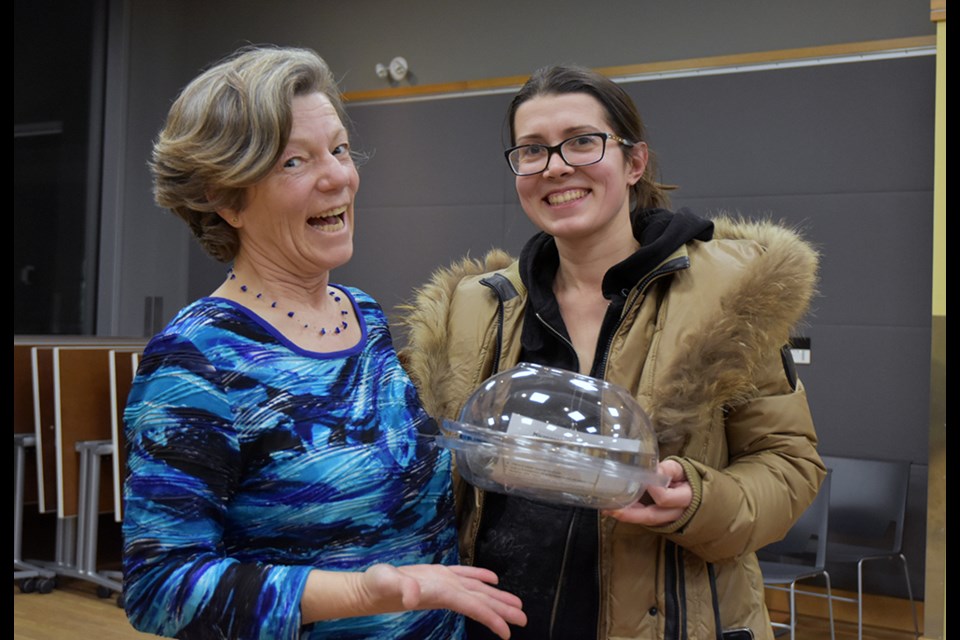When Cathy Nesbitt saw her first Tony Hornick Sprout Grower 17 years ago, her first thought was, “What is that spaceship thing?”
The clear plastic sprouter, with its plastic dome, does look something like a flying saucer.
It was at a Seedy Saturday gardening and environmental event. Nesbitt was introducing her vermicomposters that use red wiggler worms to compost household waste. In a quiet moment, she went over to talk to Hornick, who was then 72 years of age.
“I knew nothing about sprouts and sprouting,” said Nesbitt, but she was impressed by Hornick’s vitality and the information he provided on the nutritional value of sprouts. She ended up swapping a vermicomposter for a Sprout Grower, and began a regimen of eating two tablespoons of fresh sprouts every morning.
“This is my multivitamin,” Nesbitt said. “The mung beans were my private health plan.”
Nesbitt was at the Bradford West Gwillimbury Public Library recently, talking about the art of sprouting and its health benefits.
She has been selling the Tony Hornick Sprout Grower since 2012, and she recently began experimenting with a wider range of beans and microsprouts – from alfalfa and red clover, to bok choy and radish.
“Now, I’m a sprouting monster!” she said. “Sprouts really are superfoods… All the nutrients, and the flavours, are super intense.”
Dried seeds and beans are dormant, “just waiting to be put in water to come alive,” Nesbitt told an audience of more than a dozen people, who braved wintry weather to hear the talk and sample some sprouts.
The seeds and beans are storehouses of nutrients and enzymes, to kickstart plant growth – and all of that is available in the fresh sprouts, which Nesbitt called “alkalyzing, hydrating, regenerative, and biogenic.”
Nesbitt's far-ranging discussion covered everything from laughter yoga (she is a certified instructor), to the how-to of sprouting.
A Sprout Grower isn’t needed to get started. “You can sprout in jars, you can sprout in towels,” Nesbitt said.
The key is rinsing the beans and changing the water twice a day. And don’t place the sprouts in direct sunlight: “You’ll get bitter beans.”
One problem with using a jar as a sprouter is that the sprouts may end up in an overgrown tangle, making it hard to change the water and rinse away all bacteria, which is one reason why Nesbitt prefers the Hornick Sprout Grower.
“It’s fool-proof,” she said, noting the sprouts are in a single layer, with the water “touching but not covering” the beans or seeds.
The sprouting process can take from one to three days.
“As soon as the root is the size of the bean, they’re ready!” Nesbitt said.
Sprouts can be eaten raw as a snack or added to recipes. Unlike other foods, she said, “you can fill up and eat all you want.” There are no empty calories or unhealthy additives.
As for “microgreens,” they contain even more vitamin A, vitamin C and nutrients than bean sprouts, as well as higher levels of the enzymes that produce antioxidant sulforaphanes when eaten. “And the flavour is over the top,” Nesbitt said.
Sprouts are “simple, delicious, nutritious, affordable food… Look at this abundance of food, and all I need to do is add water!” said Nesbitt. “I grow my multi-vitamins on the counter for pennies a day. Nickels, because they took pennies away… Fibre, proteins, minerals – everything our bodies need.
“The more I learn about sprouts, the more I realize this is a super easy way to get nourished.”
As proof, Nesbitt points to her own high energy levels – and to Tony Hornick himself, now 90, who still attends garden shows to sell his Sprout Growers.
The audience sampled sprouts, asked questions, and filled out a ballot to win a sprouter and a bag of organic mung beans.
The winner was a delighted Karina Sherman. “I’m interested in sprouting. I really want to start!” she said.
For more information, visit cathyssprouters.com. Nesbitt not only sells the Sprout Grower, but seven types of beans and seven types of microgreen seeds – all certified organic.
Nesbitt will be at the Bradford West Gwillimbury Public Library’s Seedy Saturday, a day-long event on March 16 featuring vendors, a seed exchange, and gardening workshops on everything from butterflies, to foraging for wild food.



